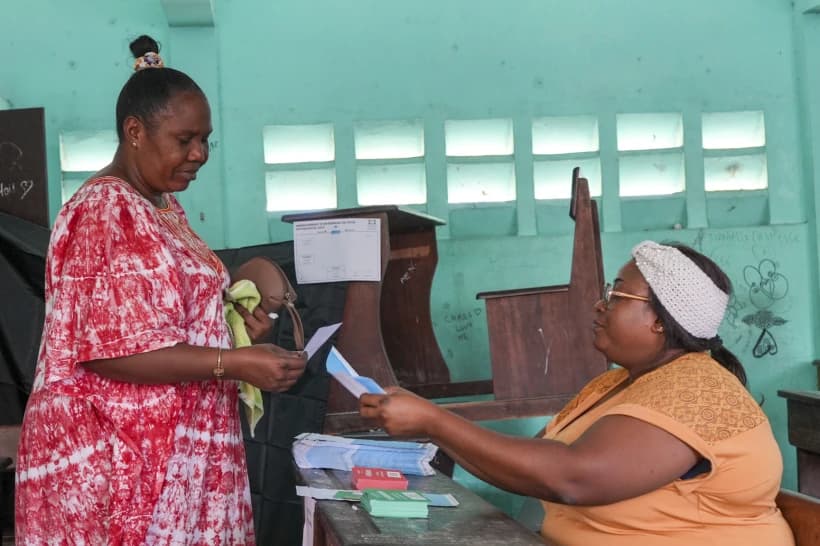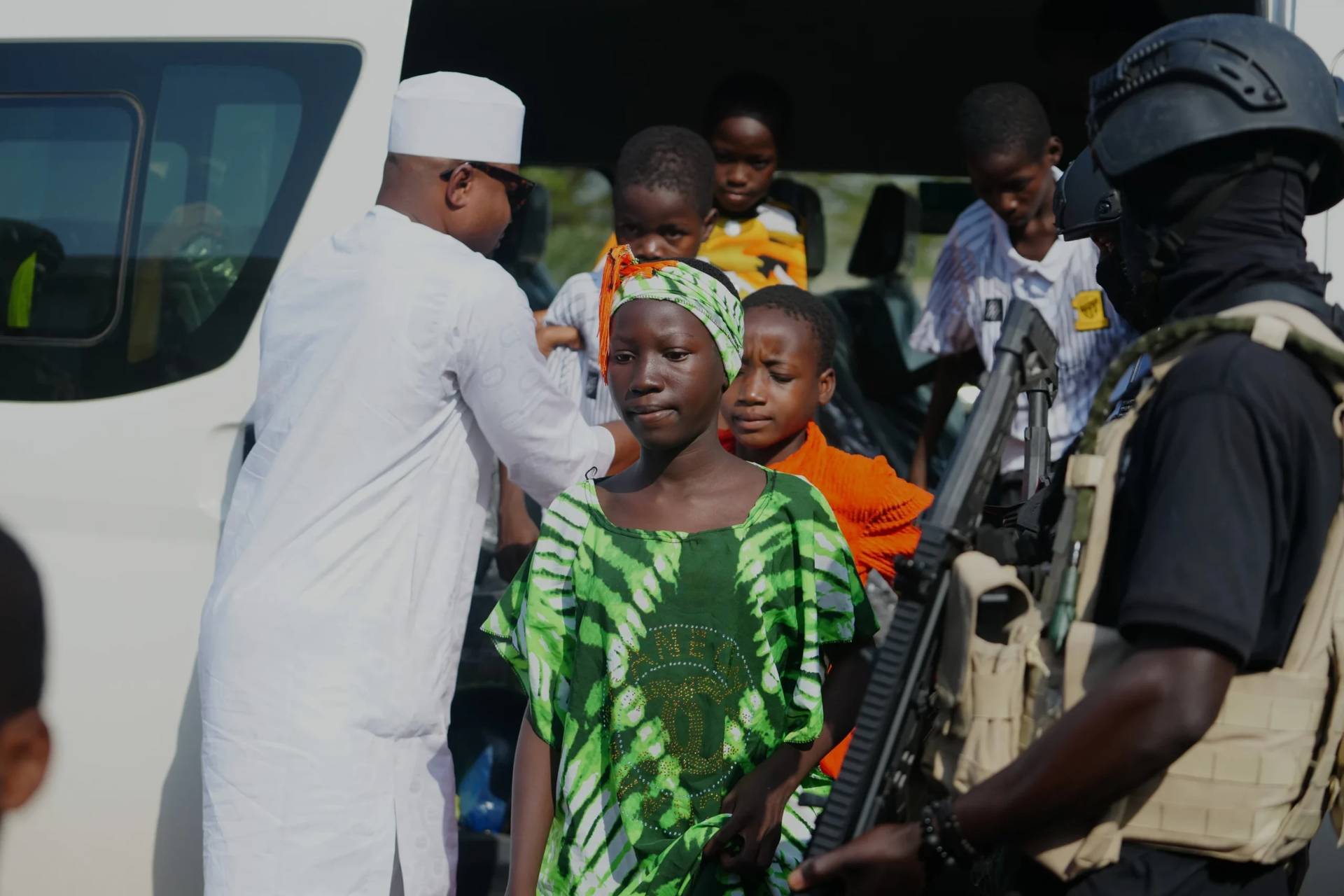YAOUNDÉ, Cameroon – Catholic Bishops in Gabon have called the November 16 constitutional referendum “a step toward democratic restoration.”
Voters went to the polls to vote for a new Constitution that would end the military transitional government and return the country to democratic rule.
Provisional results announced by the country’s interior Ministry early November 17 show an overwhelming win for the new constitution, with 91.8 percent of the electorate approving of the new constitution drafted by the military regime of General Brice Oligui Nguema.
Only 8.2 percent of voters disapproved of the new law.
Of the about 860,000 people expected to take part in the polls, only 53.54 percent of them effectively cast their ballots.
Christianity is the nation’s predominant religion, practiced by about 76 percent of the population. Catholicism is the dominant faith, and just over half of the people of Gabon – located in the western part of central Africa – are Catholic.
The new constitution proposes a seven-year presidential term, renewable once. It makes for a presidential regime with strong executive powers, where there will be no prime minister, but a vice-president appointed by the Head of State. The president will also have the power to dissolve the National Assembly.
It also requires presidential candidates to be exclusively Gabonese, born of at least one Gabonese parent by birth and married to a Gabonese person.
The constitutional referendum is the result of a National Dialogue that followed the overthrow of President Ali Bongo Ondimba on August 30 last year that ended the over five decades-rule by the Bongos.
The bishops have referred to that military takeover as a “liberation coup” that led to General Brice Oligui Nguema being installed as the Transitional leader.
The referendum, the bishops said, “represents a step toward democratic restoration following the August 30, 2023, liberation coup.”
They recognized the fact that not everybody would be comfortable with the content of the new constitution.
“Dissatisfaction and hesitation are natural in such a project. If everyone were to agree on every article, we would already be in heaven. No constitution is perfect. Not only is it always a product of compromise, but it is also subject to improvement,” the bishops said.
“Freedom of expression should not lead to inaction or emotional biases that unnecessarily prolong the transitional period, contradicting the noble commitments made by public authorities. Transition is a bridge, not a destination,” they continued.
They explained “the transitional program involves changing the foundations of governance in Gabon. This noble objective can contribute to better organization within Gabonese society.”
They praised the inclusive nature of the process leading up to Saturday’s referendum, noting that “the mechanisms used to draft this Constitution – namely, inclusive contributions and national dialogue – are morally commendable.”
“At the end of the previous regime, many unjust laws were passed privately. This time, however, you were consulted. Moreover, the articles of this new Constitution align with Augustinian theory, inspired by St. Paul, which sees judicial authority as a remedy for concupiscence and a means of coercion to encourage Gabonese citizens to cooperate for the well-being of the nation,” the bishops said.
They said the new Constitution, despite its shortcomings, “offers an opportunity to establish and manage a more just social order.”
The Constitutional Court is still expected to confirm the results of Saturday’s vote. Once that is done, the next step will be the organization of a presidential election, currently scheduled to take place in August 2025.
That will put a definitive end to the transition that began with the coup.
General Oligui has promised to return power to civilian rule, but he has made no secret of his presidential ambitions, promising “bliss” for a country that is both rich in oil and heavily in debt.
Critics say the new constitution is simply a ploy by the Transitional leader to legitimize his stay in power.
“We are creating from scratch a dictator who is designing the Constitution for himself’, “said lawyer Marlène Fabienne Essola Efountame during a major debate organized by state television on Sunday.
The constitution for instance not only proclaims the August 30, 2023 coup as “a Liberation Holiday,” it also in article 170 exempts from conviction or prosecution “ the actors of the events ranging from August 29, 2023 to the inauguration of the President of the Transition” on September 4, 2023. Critics say this provision effectively grants immunity to General Oligui and his co-conspirators.
And the over-bearing power of the executive branch of government as contained in the new constitution seems at variance with the values of democracy that make for checks and balances.
Mohamed Kheir Omer, an African-Norwegian researcher and writer based in Oslo, Norway told Crux that what’s happening in Gabon – the military taking over and then promising a return to civilian rule, and eventually just staying in power – is common currency across mostly French-speaking African countries.
“A study revealed Since 1990 indicates that 21 of the 27 coups in sub-Saharan Africa have occurred in Francophone states. But according to the same source, four countries that have seen the most coup attempts since 1952 were under British rule: Nigeria (8), Ghana (10), Sierra Leone (10), with Sudan (17) topping the list,” he told Crux.
“Most of them [military leaders who come to power through coups] are not interested in democracy or welfare of the people,” he said.
“Unfortunately, they have to do that because the African Union and Western countries are more focused on the technical aspects of elections rather than real change, so if you carry an election irrespective how much flawed that may be, you get legitimacy, you take off your uniform and you are accepted as a civilian ruler particularly in the African Union,” he told Crux.
Voting in a new constitution brings with it a sense of hope, yet also a degree of uncertainty. Catholic Bishops believe the intercession of the Blessed Virgin Mary could be critical for the country in its time of need.
“Through the intercession of Our Lady of Gabon, may divine grace and the will of the Gabonese people lead to ethical actions that give meaning to Gabon’s development and the realization of God’s kingdom in Gabon,” the bishops said.

















